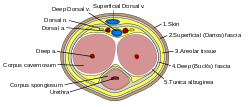The tunica albuginea is the fibrous envelope that extends the length of the corpus cavernosum penis and corpus spongiosum penis. It is a bi-layered structure that includes an outer longitudinal layer and an inner circular layer.[1]
| Tunica albuginea (penis) | |
|---|---|
 The penis in transverse section with tunica albuginea shown | |
 Transverse section of the penis | |
| Details | |
| Identifiers | |
| Latin | tunica albuginea corporum cavernosorum, tunica albuginea corporis spongiosi |
| TA98 | A09.4.01.017 A09.4.01.018 |
| TA2 | 3593 |
| FMA | 19630 |
| Anatomical terminology | |
Structure
editMicrostructure
editThe trabeculae of the tunica albuginea are more delicate, nearly uniform in size, and the meshes between them smaller than in the corpora cavernosa penis: their long diameters, for the most part, corresponding with that of the penis.[citation needed]
The external envelope or outer coat of the corpus spongiosum is formed partly of unstriped muscular fibers, and a layer of the same tissue immediately surrounds the canal of the urethra.[citation needed]
It consists of approximately 5% elastin, with the remainder mostly consisting of collagen.[2]
Function
editThe tunica albuginea is directly involved in maintaining an erection; that is due to Buck's fascia constricting the erection veins of the penis, preventing blood from leaving and thus sustaining the erect state.[clarification needed][citation needed]
Additional images
edit-
Medical ultrasonography of a normal penis
References
editThis article incorporates text in the public domain from page 1250 of the 20th edition of Gray's Anatomy (1918)
- ^ "Penis Anatomy: Gross Anatomy, Vasculature, Lymphatics and Nerve Supply". 2019-07-01.
{{cite journal}}: Cite journal requires|journal=(help) - ^ "Male Genital Anatomy » Sexual Medicine » BUMC".
External links
edit- Anatomy photo:42:07-0103 at the SUNY Downstate Medical Center - "The Male Perineum and the Penis: The Corpus Spongiosum and Corpora Cavernosa"
- Image at downstate.edu
- Image at downstate.edu
- Histology image: 17703loa – Histology Learning System at Boston University
- Encyclopedia of Reproduction